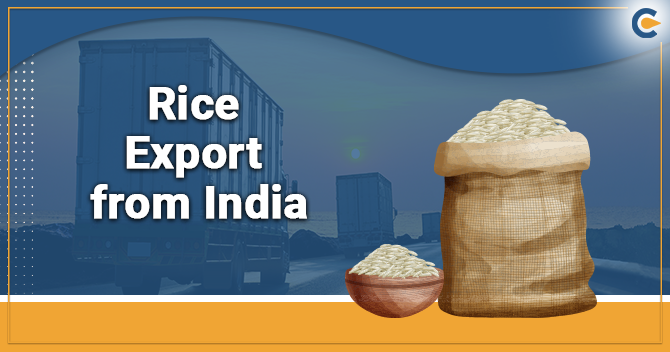India is a well-renowned country in the world when it comes to rice cultivation. India’s rice exports in the month of January to October stood at 43% as compared to the preceding year’s stats. During the aforesaid timeline, the country has managed to export 11.95 million tons of rice to overseas countries. This figure is higher than the previous year’s total, which stood at 8.34 million tons.
The Non-basmati rice witnessed a considerable spike in export volume this year. As per the Government data, the country has managed to ship more than 61% of the non-basmati rice as compared to the former year’s export volume stood at 7.6 million tonnes.
The year 2020 has been good for exporters of basmati rice so far. As per the latest stats, the exporters collectively shipped around 4.36 million tons of basmati rice this year. It should be noted that the Gulf countries are major importers of basmati rice from India. As of now, India has exported around 14 million tons of rice all across the globe.
Demand for Indian Rice across the Globe
India essentially emphasises African and Middle-East nations for exporting the non-basmati rice. But the major importers of basmati rice from India are USA & European Countries. Some other major nations that import rice from our country are Singapore, Malaysia, Saudi Arabia, Australia, etc.
Despite severe competition from other nations, India has secured second place in the global export list of rice. In order to avert the complications and intricacies of foreign trade, the Indian government has outlined relaxed Export Import Trade policies. Besides, the government slashed the price of rice for the global market to accelerate the export rate.
Important Registrations to Consider to Export Rice from India
The following section will shed some light on some important documents that would enable you to export rice from India.
Company Registration
Company registration is crucial for starting a rice export business in India. The process for obtaining company registration is fairly simple and straightforward. All you need to visit the Ministry of Corporate Affairs website and submit the online application in the SPICe + form. Such a registration imparts much-needed solidity and strong command to the business form from a legal viewpoint.
Company PAN Card
PAN Card acts as an identification proof for a company, and it is extremely mandatory to obtain. The PAN card of the company usually encloses a ten-digit alphanumeric code that contains all the information about the entity. The application regarding the PAN card can be made on the NDSL’s official portal.
Import Export Code (IEC)
IEC is a mandatory requirement for exporters and importers. An application for IEC is filled with the Directorate General of Foreign Trade (DGFT) website to make an online application regarding the same. The applicants are required to annex some crucial documents along with the application to avail the IEC Registration.
APEDA Registration
APEDA registration is mandatory for those who deal with the following scheduled products. Such registration can be availed through an online procedure.
- Floriculture & floriculture products
- Meat & meat products
- Honey, jaggery & sugar products
- Poultry & poultry products
- Dairy products
- Fruits, vegetables & their products
- Cocoa & its products
- Confectionery, biscuits & bakery products
- Groundnuts, peanuts & walnuts
- Cereal & cereal products
- Alcoholic & non-alcoholic beverages
- Pickles, papads & chutneys
- Herbal & medicinal plants
- Guar gum
To obtain the APEDA registration, the applicant must submit a web-based form within one month of undertaking the exporting business. If the exporter fails to do so within the given timeline due to reasonable cause, such a date can be extended by the authority.
Once the application is appropriately filed and furnished by the applicant along with the requested fee, the authority will grant the Registration -Cum- Membership. The documents required for obtaining APEDA registration also include Import Export Code.
FSSAI Food License
FSSAI Food License is required by those businesses that wish to establish a food business in India. The FSSAI license is granted by the FSS Authority of India, and it comes with a validity period of 1 or 5 years. A food license from FSSAI is also mandatory for exporting edible items to overseas countries.
ISO Certification
ISO certification signifies that a company is complying with the set quality standards for the production of food items. There are numerous documentation requirements and a detailed procedure involved in obtaining such certification. The applicant must file their ISO registration application under the correct ISO class to ensure a successful registration.
GST Registration
Under GST laws, the IEC holder has to pay IGST on shipping, for which it can also claim a tax refund. The process to claim such a refund has been simplified for rice exporters across India. Now, a rice exporter does not have to file a separate refund application for the export of goods or services. The shipping bill itself acts as a refund claim for the exporters.
Procedural Instructions for Obtaining the Import Export Code
Import Export Code allows a rice exporting business to ship its product overseas. The Directorate General of Foreign Trade issues the IEC to the qualified individual as per the rules prescribed under the Export-Import Policy (EXIM) and Foreign Trade Policy. The following are the procedural instructions for obtaining the Import Export Code:
- Step 1: Submit the application for IEC registration to the DGFT.
- Step 2: File the supporting documents related to the business, such as the incorporation certificate, PAN details, GST registration number, etc.
- Step 3: The DGFT then assesses such information and documents to either accept or reject the application.
- Step 4: Once the DGFT certifies the details and finds them acceptable, it grants the IEC registration to the food business to import/export rice.
Conclusion
Government efforts to promote foreign trade through various schemes are paying off now. Through export, the food industry can step forward to untapped unexplored markets that hold immense potential both in terms of customer base and revenue generation.
The rice exporting business in India is subjected to certain legal obligations, as mentioned above. If you have any issues in comprehending these prerequisites, talk to Corpbiz experts without any hesitation. Our professionals will ensure that you will receive top-notch advice on legal matters related to government certifications and registrations.
Read our article: How to get IEC Registration for Exporting Electronic Appliances from India?













